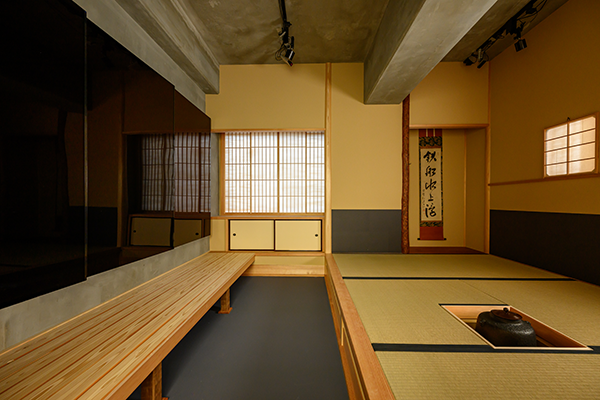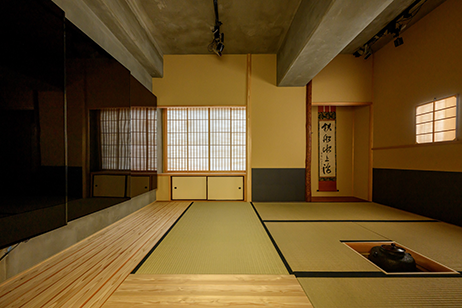~ 数寄屋建築の思想・技法とデジタル技術が融合した茶室「
株式会社ソニーコンピュータサイエンス研究所(以下、ソニーCSL)の京都研究室(室長:暦本 純一)と、株式会社ミリエームの
ソニーCSLは2020年に開設した京都研究室において、人や社会にとっての「ゆたかさ」の意味を問い直し、万人に恩恵をもたらす新たな技術開発の道筋を模索する研究を進めています。また、茶美会文化研究所は茶道裏千家15代家元鵬雲斎の二男・伊住政和によって1992年に創設された組織であり、2022年からは茶の湯文化における「伝統の継承」と「本質の探究」を両輪として文化の持続的発展を目指すという立場から研究と実践に取り組んでいます。
この度開設された茶室「寂隠」は、両社共同の活動として、『茶の湯』文化の発展的な未来を見据えて、デジタル技術の研究と実証を継続的に重ねる実践の場であり、これまでにない新しいアプローチを試みるものです。人間拡張技術※などこれまでにソニーCSLにおいて研究開発してきた様々な技術を取り入れながら、茶の湯文化の本質や精神性を尊重した茶室を構築して、新たな体験の創出に取り組み、現代社会への還元を試みることで文化の発展への貢献を目指します。
※人間拡張技術:人間と一体化して、能力を拡張させるテクノロジー https://www.sonycsl.co.jp/news/4037/


ソニーコンピュータサイエンス研究所 京都研究室内の茶室 「寂隠」
(左図:三畳土間席 / 右図:四畳枡板席 – 拡張版)
※ 監修:茶美会文化研究所 / 設計・施工:数寄屋建築 茶美会 / 撮影:小笠原 敏孝
※ 茶室名「
https://www.sonycsl.co.jp/tag/jackin/
本発表時点において、「寂隠」内に組み込まれている主要な研究開発テーマは下記の通りです。研究成果を現代の情報技術で実空間に還元し、この空間内で行う新たな体験のなかで生まれる課題を新たな視点で解決すべく、文化面への貢献も見据えた研究活動を共同で推進します。
 ◆拡張作法伝承 by JackIn Space [URL] / ※ 協力:東京大学社会連携講座、凸版印刷株式会社
◆拡張作法伝承 by JackIn Space [URL] / ※ 協力:東京大学社会連携講座、凸版印刷株式会社
茶道の稽古は身体性を伴う学びであり、師から弟子への教授を通して伝統的に受け継がれてきた作法を体得するものです。本テーマでは、茶室内の三次元空間を点群データでリアルタイムに取得することにより、人の動作や道具の配置を自由視点で確認することを実現し、茶道教授者の立ち居振る舞いはもちろん、自らの動きをゴーストとしてチェックすることで、作法伝承の一助とすることを目指します。
 ◆立体茶会記 by NeARportation [URL]
◆立体茶会記 by NeARportation [URL]
茶会での使用道具類や食事等の記録である「茶会記」は、茶会という場での体験に基づく記録であり、490年にわたり作成されてきた茶の湯文化の歴史を考える上で重要な存在です。本テーマでは、従来はテキストの記録として残されてきた茶会記を立体的な記録とすべく、茶器や茶菓子の生み出す多様な質感の三次元再現手法を提案します。
 ◆雪見扉 by Squama Yukimi [URL]
◆雪見扉 by Squama Yukimi [URL]
茶室への道筋は「客の導線提示 ― 開放」と「俗世との遮断 ― 閉鎖」が必要であり、僅かに開いた襖や露地に配置された関守石などがその役割を果たしていました。本テーマでは、オフィス内の茶室という限られた空間において、その役割を果たす仕掛けとして、部分的に透明度を制御できるプログラマブルな障子扉を構築します。入室時には中の様子が分かる程度に開放し導線を、茶室内に入るとその視界が閉じられる遮断を提示することにより、一つの扉で矛盾する2つの要求 -開放/閉鎖- を実現します。
暦本 純一(ソニーコンピュータサイエンス研究所 副所長、京都研究室 室長)のコメント
情報技術によりどこからでも瞬時に世界と接続できる時代には、「今、ここ」にしかない実世界の価値が再認識されるでしょう。一方で、茶室は都市に山居の佇まいをしつらえるべく、リアルの再構築を吟味した実空間であります。リアルとバーチャルが高い美意識で統合され、技術と文化が相互に刺激を与えながら発展していくことが未来のゆたかさにつながると考え、研究活動を展開していきます。
伊住 禮次朗(ミリエーム 茶美会文化研究所 主宰)のコメント
茶道裏千家の分家・伊住家に生まれ、微力ながら茶の湯文化における伝統の継承に携わってまいりました。約500年にわたって紡がれてきた茶の湯文化を取り巻く環境は厳しい状況が続くことが予想され、その発展的な未来を描くことの重要性を感じています。「寂隠」の存在、そしてこれから共同で行う研究は茶の湯文化のこれからを考える上でのよいモデルケースになると考えています。
※ 暦本・伊住の両名による概要についてのプレゼンテーションはこちらからご確認いただけます。
※ JackIn はソニーグループ株式会社の登録商標です。/※茶美会 及び SABIE は株式会社ミリエームの登録商標です。
株式会社ソニーコンピュータサイエンス研究所 広報窓口 csl-pr@csl.sony.co.jp
株式会社ミリエーム 茶美会文化研究所 広報窓口 contact@sabie.jp
~ Introducing Jakuin, a tea room combining sukiya architecture philosophy and techniques with digital technology. ~
Sony Computer Science Laboratories, Inc.’s (hereinafter referred to as Sony CSL) Kyoto Laboratory (Director: Jun Rekimoto), and Millieme Co., Ltd.’s Sabié Cultural Institute (President: Reijiro Izumi) will begin empirical research to the developmental potential of chanoyu (tea ceremony) culture. As a practical venue for the research, the tea room Jakuin ‐ Supervised by Sabié Cultural Institute ‐ will open in the Sony CSL Kyoto Laboratory by combining sukiya architecture philosophy and techniques with digital technology.
Sony CSL use its Kyoto Laboratory, which opened in 2020, to conduct research focused on the fulfillment of human values, and is exploring avenues for developing new technologies that benefit all people. The Sabié Cultural Institute, which was founded in 1992 by Masakazu Izumi, second son of Hounsai, the 15th Iemoto (tea Grand Master) of Urasenke, also resumed its operations in 2022 and carries out research and practical applications aimed at sustainable development of chanoyu culture via the passing on of chanoyu tradition and seeking the quintessential nature of this culture.
The recently opened tea room Jakuin is a practical venue for ongoing joint empirical research of digital technology with a view to an evolutionary future for chanoyu culture, an unprecedented new approach to this field. The two organizations seek to work together to contribute to cultural development and give back to modern society by building Jakuin that respects the essence and spirituality of chanoyu culture and creating new experiences, while incorporating various technologies researched and developed by Sony CSL, including human augmentation technology*.
*Technology that becomes one with human beings and expands their capabilities.https://www.sonycsl.co.jp/news/4037/?lang=en


The Jakuin tea room in the Sony CSL Kyoto Laboratory
[Left : three tatami seats with earthen floor / Right : four tatami seats with wooden square framing]
* Supervision: Sabié Cultural Institute / Design and construction: Sukiya, SABIÉ / Photo by Toshitaka Ogasawara
* The name Jakuin comes from “JackIn,” a research theme spearheaded by Jun Rekimoto
https://www.sonycsl.co.jp/tag/jackin/?lang=en
The main research and development themes incorporated in Jakuin at the time of this release are described below. Research results will be returned to real space using modern IT, and joint research will be aimed at making cultural contributions that resolve issues that arise from new experiences inside this space from a new perspective.
◆Passing Down Manners with Augmentation, by JackIn Space [URL]
* A collaboration with Social Cooperation Program of The University of Tokyo and Toppan Printing Co., Ltd.
 Tea ceremony training is a learning process that involves physicality. One acquires the traditional manners that have been handed down from generation to generation through master-disciple teaching. In this research theme, real-time acquisition of point cloud data from the 3D space inside the tea ceremony room enables the user to confirm from a free viewpoint such things as a person’s movements and the arrangement of utensils, and to check not only the tea ceremony instructor’s movements and personal manner but also the users own movements as a ghost, thereby aiding in the handing down of these traditional manners.
Tea ceremony training is a learning process that involves physicality. One acquires the traditional manners that have been handed down from generation to generation through master-disciple teaching. In this research theme, real-time acquisition of point cloud data from the 3D space inside the tea ceremony room enables the user to confirm from a free viewpoint such things as a person’s movements and the arrangement of utensils, and to check not only the tea ceremony instructor’s movements and personal manner but also the users own movements as a ghost, thereby aiding in the handing down of these traditional manners.
◆3D Chakaiki (tea ceremony record) by NeARportation [URL]
 Chakaiki is the Japanese term for a record based on the experience of being at a tea ceremony, including the utensils used and the food served, and is an important part of the history of a chanoyu culture that has been forged over a period of 490 years. This research theme suggests the creation of a 3D form of the Chakaiki, which traditionally has been recorded in text form, using a 3D reproduction method for the various textures of tea utensils and tea confectioneries.
Chakaiki is the Japanese term for a record based on the experience of being at a tea ceremony, including the utensils used and the food served, and is an important part of the history of a chanoyu culture that has been forged over a period of 490 years. This research theme suggests the creation of a 3D form of the Chakaiki, which traditionally has been recorded in text form, using a 3D reproduction method for the various textures of tea utensils and tea confectioneries.
◆Yukimi Door by Squama Yukimi [URL]
 The path to the tea room needs to be both “open” (to show guests the route to it) and “closed” (to cut it off from the everyday world outside); slightly open sliding doors and sekimori-ishi (barrier stones) placed outside have played these roles. In this research theme, a programmable shoji door with partially adjustable transparency is built as the device to play these roles in the limited space of a tea room inside an office. By opening the view just enough so that visitors can see what is going on inside as they enter the room, and closing off the field of vision once they are inside the room, these opposing open and closed requirements are met with a single door.
The path to the tea room needs to be both “open” (to show guests the route to it) and “closed” (to cut it off from the everyday world outside); slightly open sliding doors and sekimori-ishi (barrier stones) placed outside have played these roles. In this research theme, a programmable shoji door with partially adjustable transparency is built as the device to play these roles in the limited space of a tea room inside an office. By opening the view just enough so that visitors can see what is going on inside as they enter the room, and closing off the field of vision once they are inside the room, these opposing open and closed requirements are met with a single door.
* JackIn is a registered trademark of Sony Group Corporation.
* 茶美会 and SABIE are registered trademarks of Millieme Co.,Ltd.
Remarks by Jun Rekimoto, Deputy Director, Sony CSL /Director of Kyoto Laboratory
In an age when we can use IT to instantly connect us to the world from anywhere, the value of the real world, which only exists in the here and now, will be reaffirmed. Meanwhile, the tea ceremony room is simultaneously a carefully thought-out real space and a reconstruction of reality that gives the appearance of a mountain dwelling in the middle of a city. Our research activities going forward will be driven by our belief that integrating the real and the virtual with a sophisticated aesthetic sensibility and developing technology and culture while allowing them to stimulate each other will lead to our future well-being.
Remarks by Reijiro Izumi, President, Sabié Cultural Institute, Millieme Co., Ltd.
Having been born into the Izumi family, a branch of Urasenke, I’ve done what little I can do to pass on the traditions of chanoyu culture. Difficulties are expected in the environment surrounding this culture, which has unfolded over the past roughly 500 years, and I feel it is important to have a vision for its future development. We believe that the existence of Jakuin and our joint research will serve as a solid model case for the future of chanoyu culture.
Corporate Communications, Sony Computer Science Laboratories, Inc. csl-pr@csl.sony.co.jp
Media Relations, Sabié Cultural Institute, Millieme Co.,Ltd. contact@sabie.jp